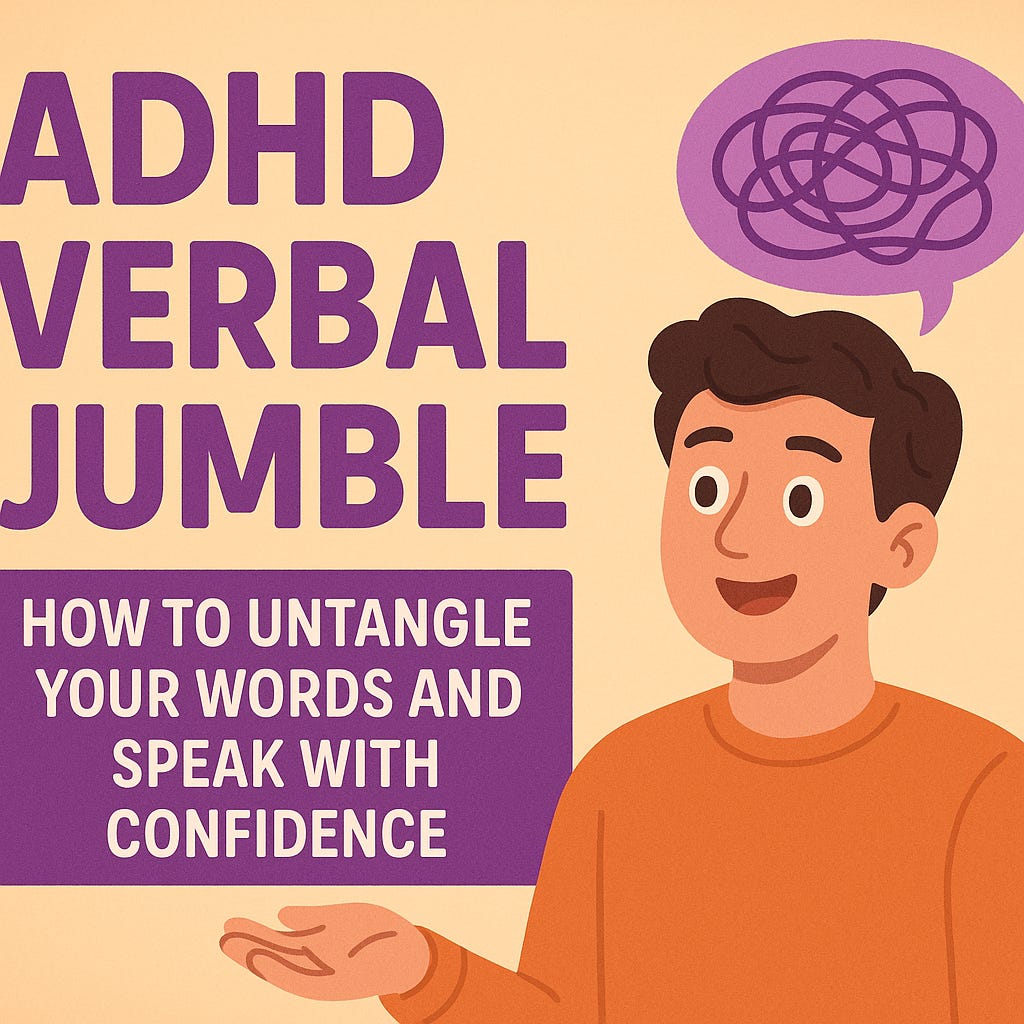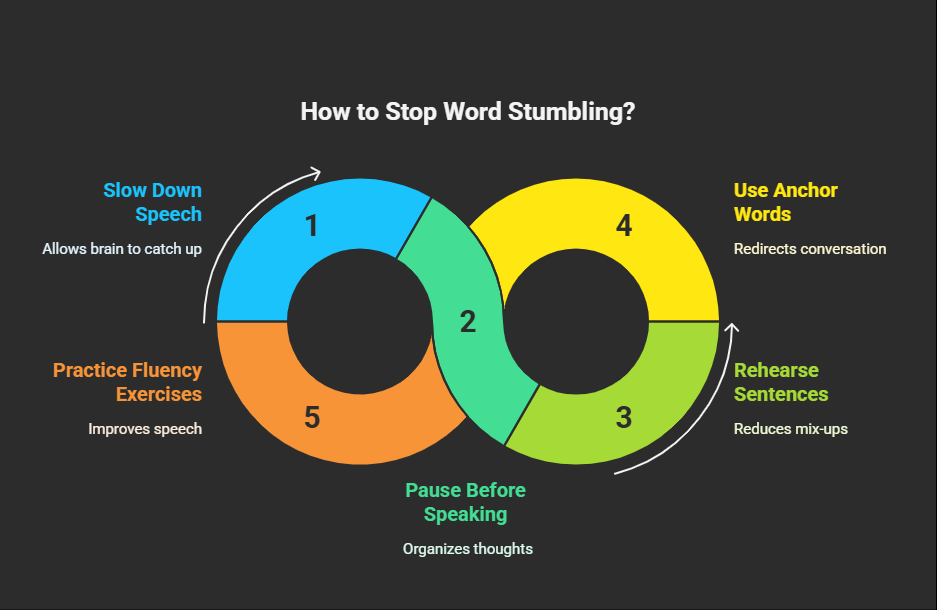🗣️ADHD Verbal Jumble: How to Untangle Your Words and Speak with Confidence!
Stop Stumbling Over Your Words – Unlock Simple Strategies to Speak Clearly and Own Every Conversation! 🚀💬
🧠 That Embarrassing Moment…
You’re in a meeting, explaining your brilliant idea. Halfway through, your brain glitches.😶 You freeze.🤔 You forget a key word.🌀 You backtrack, but now you’re rambling.
Your colleague looks at you, eyebrows raised. “Wait—what?”
Or maybe you’re telling a funny story to a friend, but mid-sentence, you mix up words:❌ “So I was… wait, hold on… uh… never mind.”
The punchline is lost. The moment is gone.
👉 Why does this keep happening?
If you have ADHD, stumbling over words isn’t just random—it’s part of how your brain works. But why? And more importantly, how can you fix it?
Let’s dive in! 🚀
🧐 What Is ADHD Word Stumbling?
ADHD word stumbling happens when your brain moves faster than your mouth, leading to:
✔️ Forgetting words mid-sentence
✔️ Mixing up similar-sounding words
✔️ Speaking too fast and tripping over words
✔️ Losing your train of thought mid-conversation
It’s not a lack of intelligence. It’s brain wiring.
🔬 The Science Behind It: ADHD affects the brain's ability to process information in a structured way. This means your brain works at a faster pace than your mouth can keep up with, often leading to the speech struggles described above. Research shows that ADHD also impacts working memory, which is critical for holding onto words while constructing sentences (Alderson et al., 2013).
Executive function issues, such as planning and organizing speech can further complicate verbal communication (Barkley, 2018).
Resources:
Alderson, R. M., Kasper, L. J., Hudec, K. L., & Patros, C. H. G. (2013). Attention-deficit/hyperactivity disorder (ADHD) and working memory in adults: a meta-analytic review. Neuropsychology, 27(3), 287–302.
⚡ When Does It Strike?
🔴 High-pressure situations – Job interviews, meetings, public speaking
😰 Anxiety & overstimulation – Too many thoughts racing at once
🤯 Fast conversations – Trying to keep up but losing words
🧠 Fatigue or brain fog – Your brain feels “off”
🌍 The Impact of ADHD Word Stumbling in Daily Life
ADHD word stumbling doesn’t just affect big presentations or high-stakes meetings. It can impact everyday interactions too:
🤝In social situations: You may feel self-conscious when trying to share stories with friends, causing frustration and isolation.
💼At work: In meetings, you might struggle to get your point across, which can affect how others perceive your abilities.
👨👩👧👦 During family conversations: Miscommunication with loved ones can lead to misunderstandings or tension.
💔Personal self-esteem: Constantly stumbling over words can lead to feelings of inadequacy or self-doubt.
But here’s the good news: With the right strategies, you can regain control, boost your confidence and communicate effectively in any situation. 🙌
🤔 Why Does This Happen? (The ADHD Brain at Work)
ADHD affects how the brain processes speech and organizes thoughts. The main culprits?
📉 Working Memory Overload – Your brain struggles to hold onto words while forming new ones (Alderson et al., 2013).
🧠 Executive Function Issues – Speech coordination relies on planning, which ADHD brains find challenging (Barkley, 2018).
⚡ Fast Brain, Slow Mouth – You think in rapid bursts, but your mouth can’t keep up.
💬 Speech Dysfluency & ADHD – Research shows ADHD is linked to increased speech disfluencies (stuttering, word repetition) (Conti-Ramsden et al., 2013).
💡 Translation? Your brain is running a marathon while your mouth is still tying its shoes.
✅ 5 ADHD-Proof Strategies to Speak Smoothly
1️⃣ Slow It Down ⏳
Consciously slow your speech. Your words need time to catch up to your brain!
The fast pace of ADHD thinking can cause a jumble of thoughts, so taking it slow helps organize them into clear speech.
2️⃣ Pause & Breathe 😮💨
Take a second before responding - it gives your brain a moment to organize your thoughts. Pausing helps regulate speech and reduce anxiety.
3️⃣ Rehearse in Your Head 🎭
Before speaking, mentally preview your sentence. This reduces mix-ups and improves speech coordination. It’s like rehearsing for a performance - planning ahead increases confidence.
4️⃣ Use Anchor Words ⚓
When you lose a word, have a fallback phrase:
👉 “What I mean is…”
👉 “Let me rephrase that…”
Anchor words can prevent you from getting stuck mid-sentence and help you redirect your conversation smoothly.
5️⃣ Practice Verbal Exercises 🗣️
Read aloud, practice tongue twisters or use apps like Speeko to improve verbal fluency. Verbal exercises train your brain and mouth to work together more efficiently.
🎭 Real-Life Example: From Word Jumbles to Clear Speech
🔥 BEFORE:
You keep tripping over your words during presentations.
You mix up phrases, lose your train of thoughts and feel embarrassed.
Your boss tells you that you need to “be more articulate”, which only makes
you more anxious.
🚀 AFTER:
✔️ Practiced pausing before speaking.
✔️ Used anchor words like “What I mean is…” when stuck.
✔️ Slowed down your speech to give your brain time to catch up.
NOW?
No more panicking mid-sentence. You speak with more confidence and your ideas shine through.
🎯 Quick Recap: How to Stop Word Stumbling?
💡 Slow down your speech – Let your brain catch up to your mouth.
😮💨 Pause before speaking – A moment of silence helps you organize your thoughts.
🧠 Rehearse sentences in your head – Planning ahead reduces mix-ups.
⚓ Use anchor words when stuck – Redirect your conversation confidently.
🗣️ Practice verbal fluency exercises – Use tools like tongue twisters and apps like Speeko to improve speech.
🚀 Final Thought: Your Words, Your Power
Your ideas matter—don’t let word stumbling hold you back. With a little practice, you can communicate clearly and confidently.
🎯 Which strategy will you try first? Let me know below! 👇
📢 Share this with someone who needs it!
👉 Subscribe for ADHD-friendly tips and support my work.
You got this! 💡
Hope it helps!
Rgds,
Lud










